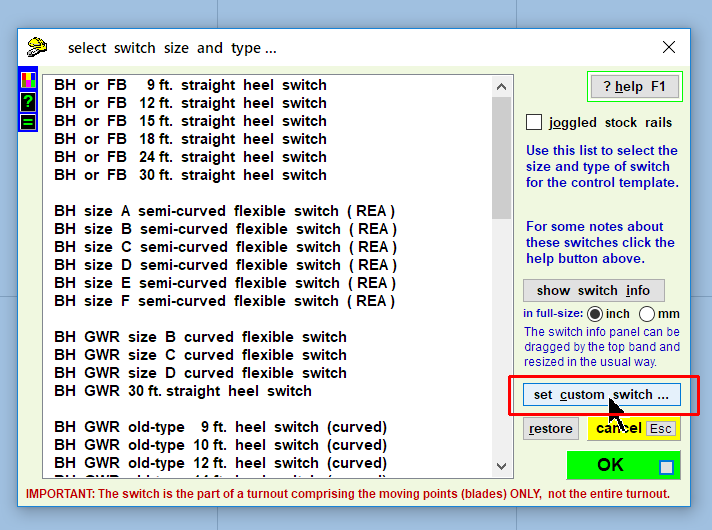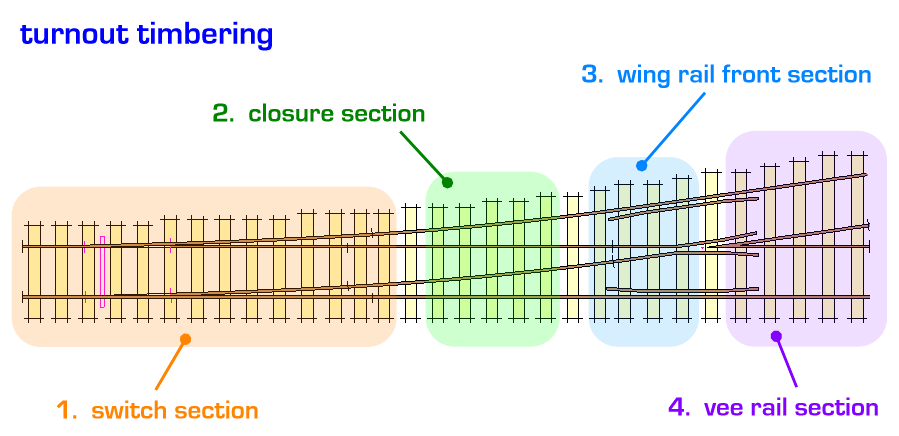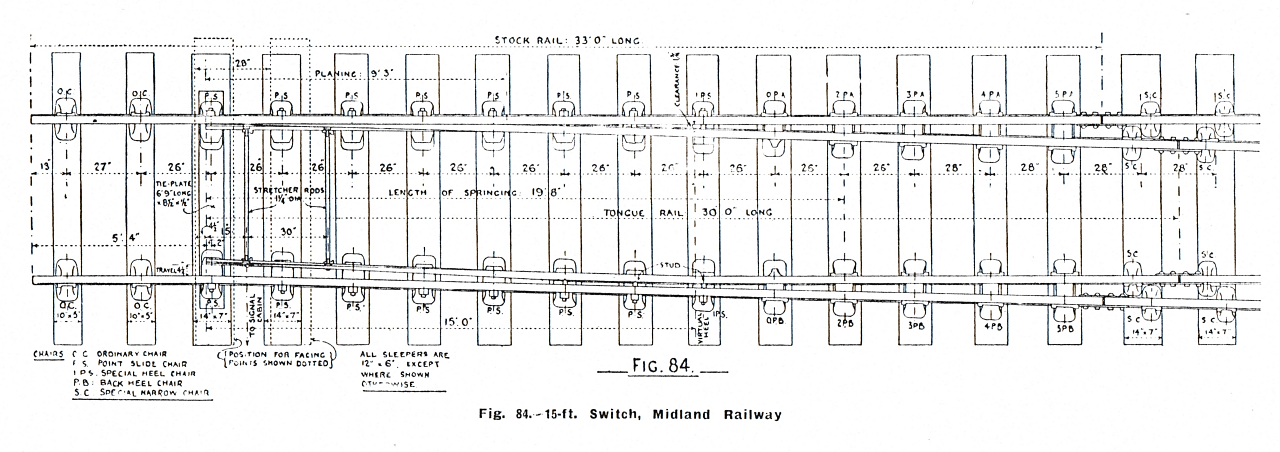Templot Club Archive 2007-2020
|
|||
| author | remove search highlighting | ||
|---|---|---|---|
|
posted: 9 Oct 2018 05:34 from: Graeme Lewis
click the date to link to this post click member name to view archived images |
Hi I have recently begun using the "shove timber" function to try and emulate Midland Railway sleepering for turnouts (rather than drawing the timbers by hand on the base board). This works very well. However, I am having little success in trying to copy the control template once I have modified the sleeper spacings and widths. For example, I went into Real/Switch Settings and set an A switch using the control template which had been modified to the desired timbering. However, when I apply this for other turnouts the timbering stays as per the Templot default. I have also tried copying a whole turnout and adding this but usually I get a message saying I cannot do this because it is already in the storage box. I can manually modify every turnout but for a layout 70' x 22' some short cuts are desirable! Any help would be appreciated. Regards Graeme Lewis |
||
| Attachment: attach_2763_3338_Ashton_Old_Road_station_looking_in_up_direction.JPG 194 | |||
|
posted: 9 Oct 2018 22:33 from: Martin Wynne
click the date to link to this post click member name to view archived images |
Hi Graeme, Welcome to Templot Club. Some impressive pointwork there. We need a bit more information -- the Midland Railway didn't use REA switches (introduced 1925), so if you have MR data you should probably be creating a custom switch: 2_091700_410000000.png  To customize the timbering in the rest of the turnout you can use the real > timbering > timbering data... and real > V-crossing options > customize V-crossing > menu items: timber_spacings_899x436.png  For more information on the above, see: http://templot.com/companion/timber_spacings_overview.php The shove timber functions are intended to create modifications specific to a single template, rather than to replicate standard prototype designs*. For example if 2 timbers conflict in a junction, or a timber needs shortening to clear an obstruction, or lengthening to carry rodding cranks. * but in some cases they may be the only way of doing that. To save and re-use any setting in Templot you need to store a template containing it. Usually marked as a library template to remind you why it's in the file, program > store as library template menu item. It can then be copied onto the trackpad before being modified for the next track location, or some settings can be obtained from it -- such as a custom switch. On the storage box, edit > obtain to the control template > menu items. (Note that obtaining does not copy any timber shoving -- to do that you need to copy the entire turnout to the control template.) but usually I get a message saying I cannot do this because it is already in the storage boxYou will see that only if you are adding templates from a file. There is no reason to add duplicate templates from a file because you can easily copy the one you already have, if needed. I can manually modify every turnout but for a layout 70' x 22' some short cuts are desirable!You don't need to do that, but to explain we need a bit more information about your MR data. Please post your .box file as an attachment here if you can. cheers, Martin. |
||
|
posted: 10 Oct 2018 11:58 from: Graeme Lewis
click the date to link to this post click member name to view archived images |
Martin Thanks for your very quick response. I had thought that having saved a turnout as a file I could then simply add it ad infinitum - however copying it works well - the only snag being with a large layout it can sometimes be difficult finding the right turnout to copy! I attach a box file for my version of a MR A7 turnout. (By the way, I had never considered using A switches until I corresponded with a retired BR perway engineer. The beauty of an A7 is that it is a "natural" turnout and for 7mm has a radius of 2.4m in slightly less space than the more usual B6, which has a sharper turnout radius). The timbering is based on the drawing of a MR 15' straight planed switch at page 94 of Modern British Permanent Way by Cecil J Allen, published 1915. Similarly the timbering at the vee and wing is from page 131 of the same reference. I have interpreted this for a variety of crossing angles and for 9', 12' and 15' straight planed switches. For convenience (ie, laziness) I have normalised the dimensions a little. I wasn't aware of the library template function and will have a fiddle with that. Regards G |
||
| Attachment: attach_2765_3338_MR_A7_turnout.box 172 | |||
|
posted: 10 Oct 2018 13:14 from: Martin Wynne
click the date to link to this post click member name to view archived images |
Graeme Lewis wrote: however copying it works well - the only snag being with a large layout it can sometimes be difficult finding the right turnout to copy!Hi Graeme, To find the right template, store it as a library template. It is then easy to find in the storage box and copy from there (coloured in green). "A" switches are useful, but they are not used in running lines because of the severe 1:24 deflection. The MR didn't have an A7 turnout. What you have created is a 9ft loose-heel straight switch, with some shoved timbering. Here is the MR 15ft switch which you mentioned: 2_100740_260000000.png  It is a flexible switch, not loose-heel, and the geometry differs significantly from a 9ft switch. It can be created as a custom switch in its own right. It could then be selected and obtained into any template in the same way as the other switches in the list: 2_091700_410000000.png  It won't need any timber shoving for the timber positions (although the four 14" wide timbers will need to be widened that way). I seem to remember covering all this in a video a few years ago, but I can't find it at present. I will make a new Templot2 video showing how to create and re-use a custom switch, based on this MR example, but it will take me a day or two. cheers, Martin. |
||
|
posted: 11 Oct 2018 12:15 from: Graeme Lewis
click the date to link to this post click member name to view archived images |
Martin I am aware that A (9') switches weren't used in running lines which is why I was surprised when the perway engineer suggested it. To be honest I have used one on a branch line to a private siding - so only trains shunting the siding experience the 1 in 24 deflection. From a modelling perspective it works very well. I have always used flexible switches but am now beginning to think I should look at using loose heel 9' switches. I was surprised when you say the MR didn't use A7's (to use the more modern terminology). My understanding is that (within sensible limits), you could combine switches and vee crossings to suit any given situation. I would love to know if there is some reference giving more info on MR track work. I have used the custom switch function by manually inserting the sleeper spacing's for 12' and 15' flexible straight cut switches. Essentially the sleeper spacing's are the same as Cecil Allen seems to suggest that the MR used the same rail lengths so the sleeper spacing has to be the same, but the divergence differs. I have also used the vee and wing custom settings and these work well - thanks. However, I have a suspicion that when I close the current file they will be lost - how do I save them for reuse? I attach a MR C9 - or should it be a 15' straight planed switch with 1 in 9 vee? This uses the above custom settings though it doesn't include the wider 14" sleepers and I have standardised the wing and vee sleeper spacing's - in reality they varied a bit (according to Mr Allen). Regards G |
||
| Attachment: attach_2766_3338_MR_C9_turnout.box 177 | |||
|
posted: 11 Oct 2018 12:40 from: Martin Wynne
click the date to link to this post click member name to view archived images |
Graeme Lewis wrote: I was surprised when you say the MR didn't use A7's (to use the more modern terminology). My understanding is that (within sensible limits), you could combine switches and vee crossings to suit any given situation. I would love to know if there is some reference giving more info on MR track work.Hi Graeme, Sorry, I didn't mean to suggest that the MR didn't have a turnout of that equivalent size. I meant that bullhead switches called "A" were introduced by the REA in the SRC designs of 1925, with specific dimensions. For example they are semi-curved switches with a switch radius of 482ft. No doubt the MR had a short switch of similar overall size but not identical. Bob Essery wrote some articles about MR trackwork in issues of Midland Record magazine. Sorry I don't have the ref numbers. The HMRS/Midland Railway Museum at Butterley is probably the best contact for more information, see: http://hmrs.org.uk/msc cheers, Martin. |
||
|
posted: 12 Oct 2018 11:45 from: Graeme Lewis
click the date to link to this post click member name to view archived images |
Martin Many thanks for your responses - this has been most helpful. I have all of the Midland Records so I will spend some time studying the photos to try and capture the quite distinctive look that MR track had. Regards G |
||
| Please read this important note about copyright: Unless stated otherwise, all the files submitted to this web site are copyright and the property of the respective contributor. You are welcome to use them for your own personal non-commercial purposes, and in your messages on this web site. If you want to publish any of this material elsewhere or use it commercially, you must first obtain the owner's permission to do so. |